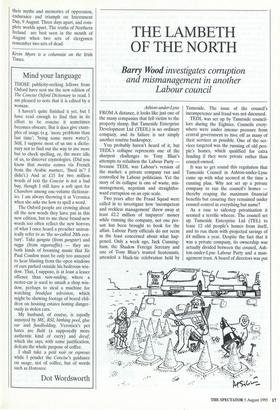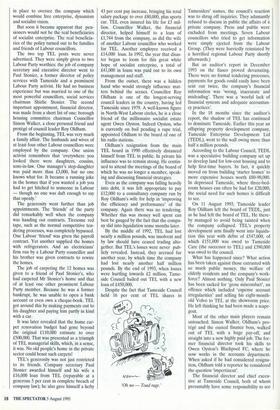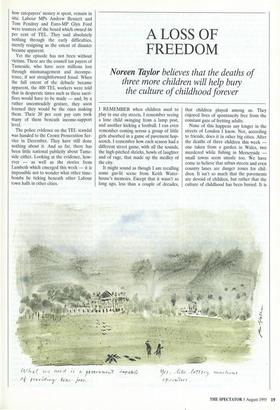THE LAMBETH OF THE NORTH
Barry Wood investigates corruption
and mismanagement in another Labour council
Ashton-under-Lyne FROM A distance, it looks like just one of the many companies that fell victim to the property slump. But Tameside Enterprise Development Ltd (TEDL) is no ordinary company, and its failure is not simply another routine bankruptcy.
You probably haven't heard of it, but TEDL's collapse represents one of the sharpest challenges to Tony Blair's attempts to refashion the Labour Party — because TEDL was Labour's version of the market: a private company run and controlled by Labour politicians. Yet the story of its collapse is one of waste, mis- management, nepotism and straightfor- ward corruption on an epic scale.
Two years after the Fraud Squad were called in to investigate how 'incompetent and reckless management' threw away at least £2.2 million of taxpayers' money while running the company, not one per- son has been brought to book for the affair. Labour Party officials do not seem in the least concerned about what hap- pened. Only a week ago, Jack Cunning- ham, the Shadow Foreign Scretary and one of Tony Blair's trusted lieutenants, attended a black-tie celebration held by Tameside. The issue of the council's incompetence and fraud was not discussed.
TEDL was set up by Tameside council- lors during the Eighties. Councils every- where were under intense pressure from central government to hive off as many of their services as possible. One of the ser- vices targeted was the running of old peo- ple's homes, which qualified for extra funding if they were private rather than council-owned.
It was to get round this regulation that Tameside Council in Ashton-under-Lyne came up with what seemed at the time a cunning plan. Why not set up a private company to run the council's homes — thereby reaping the maximum financial benefits but ensuring they remained under council control in everything but name?
As a ruse to sidestep privatisation it seemed a terrific wheeze. The council set up Tameside Enterprise Ltd (TEL) to lease 12 old people's homes from itself, and to run them with projected savings of £4 million a year. Despite the fact that it was a private company, its ownership was actually divided between the council, Ash- ton-under-Lyne Labour Party and a man- agement trust. A board of directors was put in place to oversee the company which would combine free enterprise, dynamism and socialist vision.
But soon it became apparent that pen- sioners would not be the real beneficiaries of socialist enterprise. The real beneficia- ries of the policy turned out to be families and friends of Labour councillors.
The two top TEL posts were never advertised. They were simply given to two Labour Party worthies: the job of company secretary and executive director went to Paul Stonier, a former director of policy services with Tameside and a prominent Labour Party activist. He had no business experience but was married to one of the most powerful councillors, social services chairman Shirlie Stonier. The second important appointment, financial director, was made from a short list of one: borough housing committee chairman Councillor Simon Walker, a close personal friend and protégé of council leader Roy Oldham.
From the beginning, TEL was very much a family affair. The husbands and wives of at least four other Labour councillors were employed by the company. One union activist remembers that 'everywhere you looked there were daughters, cousins, sons-in-law. One manager's step-daughter was paid more than £3,000, but no one knows what for. It became a running joke in the homes that if you wanted a job you had to get hitched to someone in Labour — though no one was daft enough to say that openly.'
The generosity went further than job appointments. The 'friends' of the party did remarkably well when the company was handing out contracts. Tiresome red tape, such as the normal competitive ten- dering processes, was completely bypassed. One Labour 'friend' was given the payroll contract. Yet another supplied the homes with refrigerators. And an electricians' firm run by a Labour Party councillor and his brother was given contracts to rewire the homes.
The job of carpeting the 12 homes was given to a friend of Paul Stonier's, who had carpeted Mr Stonier's home and that of at least one other prominent Labour Party member. Because he was a former bankrupt, he was unable to open a bank account or even own a cheque-book. TEL got around this by making payments out to his daughter and paying him partly in kind with a car.
It was later revealed that the home car- pet renovation budget had gone beyond the original £110,000 estimate to over £500,000. That was presented as a triumph of TEL managerial skills, which, in a sense, it was. No old people's home in the private sector could boast such carpets!
TEL's generosity was not jpst restricted to its friends. Company sebretary Paul Stonier awarded himself and his wife a £16,000 loan from TEL (repayable at a generous 5 per cent in complete breach of company law); he also gave himself a hefty 43 per cent pay increase, bringing his total salary package to over £80,000, plus sports car. TEL even insured his life for £3 mil- lion. Councillor Walker, the financial director, helped himself to a loan of £1,744 from the company, as did the wife of another Labour councillor who worked for TEL. Another employee received a £14,000 loan. In 1992, the year that disas- ter began to loom for this great white hope of socialist enterprise, a total of £41,000 in loans was paid out to its own management and staff.
From the outset, there was a hidden hand who would strongly influence mat- ters behind the scenes. Councillor Roy Oldham is one of the longest-serving council leaders in the country, having led Tameside since 1979. A well-known figure in North-West Labour circles, he is a close friend of the millionaire socialist estate agent Owen Oyston. Indeed Oyston, who is currently on bail pending a rape trial, appointed Oldham to the board of one of his radio stations.
Oldham's resignation from the main TEL board in 1990 effectively distanced himself from TEL in public. In private his influence was to remain strong. He contin- ued to attend the meetings of the board of which he was no longer a member, speak- ing and discussing financial strategies.
Even as the company was falling heavily into debt, it was felt appropriate to pay £12,000 to a consultancy company run by Roy Oldham's wife for help in 'improving the efficiency and performance' of the company. Again there was no tendering. Whether this was money well spent can best be gauged by the fact that the compa- ny slid into liquidation some months later.
By the middle of 1992, TEL had lost nearly a million pounds, was insolvent and by law should have ceased trading alto- gether. But TEL's losses were never pub- licly revealed. Instead, they accrued for another year, by which time the company had lost nearly another half million pounds. By the end of 1993, when losses were hurtling towards £2 million, Tame- side Council bailed out TEL with a new loan of £450,000.
Despite the fact that Tameside Council held 16 per cent of TEL shares in 'Oh no — Toad rage.' Tamesiders' names, the council's reaction was to shrug off inquiries. They adamantly refused to discuss in public the affairs of a private company. Press and public were excluded from meetings. Seven Labour councillors who tried to get information were simply ejected from the Labour Group. (They were hurriedly reinstated by a horrified regional Labour Party shortly afterwards.) But an auditor's report in December 1993 on the fiasco proved devastating. There were no formal tendering processes, payments for goods could easily have been sent out twice, the company's financial information was 'wrong, inaccurate and misleading'. There was a 'woeful lack of financial systems and adequate accountan- cy practices'.
In the 18 months since the auditor's report, the shadow of TEL has continued to dominate Tameside. Earlier this year an offspring property development company, Tameside Enterprise Development Ltd (TEDL), went to the wall owing more than half a million pounds.
According to the Labour Council, TEDL was a speculative building company set up to develop land for low-cost housing and to help first-time buyers. In fact, it quickly moved on from building 'starter homes' to more expensive houses worth £80-90,000. In depressed Tameside, where three-bed- room houses can often be had for £20,000, the social need for such homes is difficult to see.
On 11 August 1993, Tameside leader Roy Oldham left the board of TEDL, just as he had left the board of TEL. He there- by managed to avoid being tainted when the company collapsed. TEL's property development arm finally went into liquida- tion this year with debts of £547,000, of which £151,000 was owed to Tameside Care (the successor to TEL) and £390,000 was owed to the council.
What has happened since? What action has been taken against those entrusted with so much public money, the welfare of elderly residents and the company's work- force? Almost nothing. Only Paul Stonier has been sacked for 'gross misconduct', an offence which included 'expense account irregularities' and selling his eight-month- old Volvo to TEL at the showroom price. He left thinking he had been made a scape- goat.
Most of the other main players remain untouched. Simon Walker, Oldham's pro- tégé and the ousted finance boss, walked out of TEL with a huge pay-off, and straight into a new highly paid job. The for- mer financial director took his skills to Owen Oyston's Blackpool FC, where he now works in the accounts department. When asked if he had considered resigna- tion, Oldham told a reporter he considered the question 'impertinent'.
The financial director and chief execu- tive at Tameside Council, both of whom presumably have some responsibility to see how ratepayers' money is spent, remain in situ. Labour MPs Andrew Bennett and Tom Pendrey and Euro-MP Glyn Ford were trustees of the board which owned 66 per cent of TEL. They said absolutely nothing through the early difficulties, merely resigning as the extent of disaster became apparent.
Yet the episode has not been without victims. There are the council tax payers of Tameside, who have seen millions lost through mismanagement and incompe- tence, if not straightforward fraud. When the full extent of the debacle became apparent, the 400 TEL workers were told that in desperate times such as these sacri- fices would have to be made — and, by a rather uncomradely gesture, they soon learned they would be the ones making them. Their 20 per cent pay cuts took many of them beneath income-support level.
The police evidence on the TEL scandal was handed to the Crown Prosecution Ser- vice in December. They have still done nothing about it. And so far, there has been little national publicity about Tame- side either. Looking at the evidence, how- ever — as well as the stories from Lambeth which emerged this week — it is impossible not to wonder what other time- bombs lie ticking beneath other Labour town halls in other cities.




















































 Previous page
Previous page